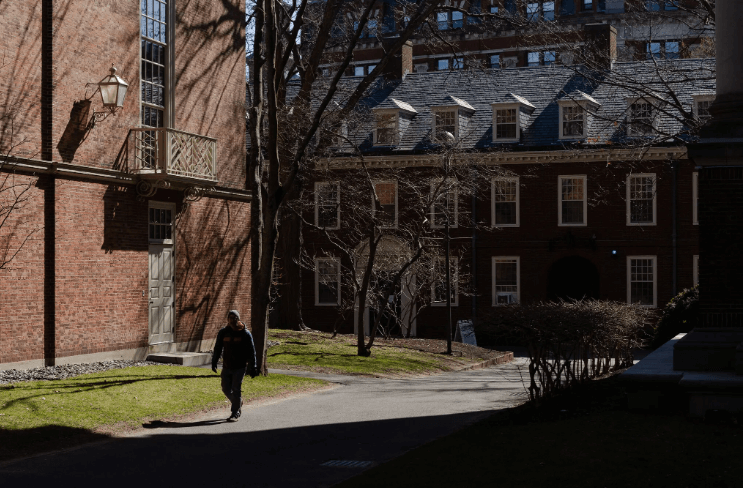特朗普威胁哈佛大学税收地位,加大数十亿美元施压力度

【中美创新时报2025年4月15日编译讯】(记者温友平编译)哈佛大学拒绝了白宫对其项目施加更多控制的请求。联邦法律禁止总统指示美国国税局进行具体的税务调查。《纽约时报》记者泰勒·佩格安德鲁·杜伦玛吉·哈伯曼和乔纳森·斯旺对此作了下述报道。
在哈佛大学拒绝了特朗普政府提出的一系列政策改革要求后,特朗普总统于周二威胁哈佛大学的免税地位,这导致总统与美国最富有、最古老的大学之间的争执急剧升级。
此前一天,特朗普政府暂停了对哈佛大学超过20亿美元的联邦资助,原因是该校拒绝改变其招聘、招生流程和课程设置。据一位了解总统考虑的人士透露,特朗普在周一晚上看到哈佛大学拒绝改变的新闻报道后,决定加大施压力度。由于涉及私人谈话,此人要求匿名。
“如果哈佛继续推动政治、意识形态和恐怖主义煽动/支持的‘病态’,或许它应该失去免税地位,并作为政治实体纳税?”特朗普周二早上在“真相社交”上发帖称。“记住,免税地位完全取决于是否符合公众利益!”
白宫官员周二表示,美国国税局将独立决定哈佛大学的免税地位,但总统私下里明确表示,他无意放弃与哈佛大学的斗争。
失去免税地位可能随着时间的推移使哈佛大学损失数十亿美元。
这是特朗普与学术界之间更广泛的斗争的最新转折。此前,特朗普政府威胁要停止向各高校提供数十亿美元的联邦资金,表面上是为了清除美国大学校园里的“觉醒”意识形态。特朗普政府官员曾暗示,像哈佛这样的学校一直是反犹太主义、精英主义和压制言论自由的温床。
联邦法律禁止总统“直接或间接”指示国税局进行具体的税务调查,目前尚不清楚该机构是否会真正推进调查。国税局发言人拒绝置评。
“通过税收制度选择性地迫害政治对手,这简直就是独裁,”前财政部长、哈佛大学前校长劳伦斯·萨默斯说道。“这既不合情理,也是错误的,但它延续了我们在特朗普总统对待大学和税收执法方面所看到的趋势。”
哈佛大学的官员没有回应置评请求。
组织必须申请才能获得免税资格。美国国税局将进行审计,在某些情况下,例如,如果发现某个组织参与过多的政治或商业活动,可能会撤销该组织的免税资格。前美国国税局官员表示,实体可以就此类决定向法院上诉,或达成和解,以试图保留其免税资格。
前美国国税局局长约翰·科斯金(John Koskinen)表示,鉴于哈佛大学拥有众多研究和教学职能,美国国税局不太可能成功撤销其免税资格。然而,不得不在法庭上就此问题提起诉讼,本身也可能对哈佛大学构成威胁。
科斯金宁先生在谈到免税机构类别时表示:“让国税局真正撤销一所重点大学的501(c)(3)资格的可能性几乎为零。问题是,你这样做会让人们花费大量时间和金钱来回应和维护他们的行为。”
由于享有免税资格,哈佛大学基本上无需纳税,但特朗普 2017 年的税收法案对大学巨额捐赠基金征税,而共和党现在希望大幅提高这一税率。
此外,捐赠给这所研究型大学的款项可以免税。这有助于吸引那些希望自主支配收入而非将资金交给联邦政府的超级富豪捐赠者提供巨额捐款。一些著名的共和党捐赠者,例如亿万富翁约翰·保尔森和肯·格里芬,已经向哈佛大学捐赠了数亿美元。
免税组织长期以来一直是美国国税局的政治雷区。在奥巴马政府期间,共和党议员指责该机构不公平地针对寻求免税地位的保守派政治团体,但后来监管机构得出结论,该机构对保守派和自由派组织都进行了不当审查。
“经济学家们已经广泛研究并证明了,可抵税的慈善捐款对大学支持有着巨大的影响,”萨默斯先生说。“取消哈佛大学的501(c)(3)优惠地位是不可能发生的,因为我们是一个法治国家。但如果取消,将会破坏医学和科学研究的进步,损害美国和西方价值观的维护,损害下一代美国人的机会,损害美国在世界上的重要吸引力。”
特朗普政府多次试图将国税局变成政治工具,通过推动国税局帮助移民和海关执法局驱逐无证移民,颠覆了长期以来对敏感纳税人信息的保护。
政府官员还大幅裁减了国税局(IRS)的工作人员,并任命前共和党众议员比利·朗(Billy Long)领导这个历来不关心政治的机构。朗在税务方面经验不足,除了推广一项充斥着欺诈的税收抵免政策外,几乎没有其他经验。与民主党和自由派结盟的非营利组织正准备迎接国税局在特朗普政府领导下对其免税资格的审查。
上周,特朗普政府官员致函哈佛大学,要求该校进行改革,并定期报告改革实施的进展情况,以继续“维持”与政府的财务关系。哈佛大学拒绝了这一要求。
哈佛大学校长艾伦·加伯周一在给学校的一份声明中表示:“任何政府——无论哪个政党执政——都不应该规定私立大学可以教授什么、可以招收和聘用谁、以及可以从事哪些研究和探究领域。”
特朗普政府的回应是冻结超过20亿美元的资金,但具体资金细节尚不清楚。哈佛大学获得约90亿美元的联邦资金,其中70亿美元用于其位于波士顿和马萨诸塞州剑桥的11家附属医院,包括波士顿儿童医院和丹娜—法伯癌症研究所。其余20亿美元直接用于哈佛大学的研究经费,涵盖太空探索、糖尿病、癌症、阿尔茨海默病和结核病等领域。
哈佛大学拥有超过500亿美元的捐赠基金,在承受资金损失方面具有独特的优势。相比之下,捐赠基金规模小得多的哥伦比亚大学在面临特朗普政府要求其修改政策和项目的压力时,最终与特朗普政府达成了和解。
白宫新闻秘书卡罗琳·莱维特 (Karoline Leavitt) 将有关哈佛大学免税资格的问题推迟到美国国税局
“总统的诉求就是:不要违反联邦法律,这样才能拿到联邦资金,”莱维特周二告诉记者。“我认为总统也提出了一个好问题。哈佛大学拥有超过500亿美元的捐赠基金,却要损失超过20亿美元:为什么美国纳税人要资助一所银行里已经有数十亿美元的大学?我们当然不应该资助一个存在如此严重反犹太主义的地方。”
Anemona Hartocollis对本文亦有贡献。
题图:一个人走在红砖建筑环绕的庭院里。哈佛大学与特朗普总统之间的争端已导致数十亿美元的拨款面临风险。信用…索菲·帕克为《纽约时报》撰稿
附原英文报道:
Trump Threatens Harvard’s Tax Status, Escalating Billion-Dollar Pressure Campaign
Harvard has rejected an effort by the White House to exert more control over its programs. Federal law prohibits the president from telling the I.R.S. to conduct specific tax investigations.
A person walks in a courtyard surrounded by red-brick buildings.
A dispute between Harvard University and President Trump has put billions of dollars in grants at stake.Credit…Sophie Park for The New York Times
By Tyler PagerAndrew DuehrenMaggie Haberman and Jonathan Swan
April 15, 2025
President Trump threatened Harvard University’s tax-exempt status on Tuesday after the school rebuffed his administration’s demands for a series of policy changes, a dramatic escalation in the feud between the president and the nation’s richest and oldest university.
The threat came a day after the Trump administration halted more than $2 billion in federal funding for Harvard because the university rejected changes to its hiring and admissions practices and curriculum. Mr. Trump decided to ratchet up his pressure campaign after watching news coverage of Harvard’s resistance on Monday night, according to a person with knowledge of the president’s deliberations, who spoke on the condition of anonymity to discuss private conversations.
“Perhaps Harvard should lose its Tax Exempt Status and be Taxed as a Political Entity if it keeps pushing political, ideological, and terrorist inspired/supporting ‘Sickness?’” Mr. Trump posted on Truth Social on Tuesday morning. “Remember, Tax Exempt Status is totally contingent on acting in the PUBLIC INTEREST!”
White House officials said Tuesday that the Internal Revenue Service would make its decision about Harvard’s tax-exempt status independently, but the president has made clear in private that he has no intention of backing down from the fight with the university.
Losing its tax-exempt status could over time cost Harvard billions of dollars.
It’s the latest turn in a battle between Mr. Trump and academia more broadly, in which the Trump administration threatened to withhold billions in federal funding from various colleges and universities, ostensibly as a way to purge “woke” ideology from America’s college campuses. Trump officials have suggested that schools like Harvard have been hotbeds of antisemitism, elitism and suppression of free speech.
Federal law prohibits the president from “directly or indirectly” telling the I.R.S. to conduct specific tax investigations, and it is unclear whether the agency would actually move forward with an investigation. A spokeswoman for the I.R.S. declined to comment.
What you should know. The Times makes a careful decision any time it uses an anonymous source. The information the source supplies must be newsworthy and give readers genuine insight.
“Selective persecution of your political adversaries through the tax system is the stuff of dictatorship,” said Lawrence Summers, the former Treasury secretary and former president of Harvard. “This is unconscionable and wrong but a continuation of trends we have seen in President Trump’s approach both to universities and to tax enforcement.”
Officials at Harvard did not respond to a request for comment.
Organizations have to apply to become tax-exempt. The I.R.S. will conduct audits and in some cases revoke an organization’s tax-exempt status if, for example, the I.R.S. finds that the group is engaging in too much political or commercial activity. Entities can appeal such a decision in court or enter into a settlement to try to preserve their status, former I.R.S. officials said.
John Koskinen, a former I.R.S. commissioner, said that it was unlikely that the I.R.S. could successfully revoke Harvard’s tax-exempt status, given its array of research and teaching functions. Still, having to litigate the question in court could be its own form of intimidation for Harvard.
“The chances of getting the I.R.S. to actually revoke the 501(c)(3) status of a major university is almost nonexistent,” Mr. Koskinen said, referring to a tax-exempt category of organizations. “The problem is you’re causing people to spend a lot of time and money responding and defending their actions.”
Because of its exempt status, Harvard for the most part does not have to pay taxes, though Mr. Trump’s 2017 tax bill instituted a tax on large university endowments that Republicans now want to substantially increase.
Moreover, donations to the research university are tax deductible. That helps draw gigantic donations from ultrawealthy donors who want to choose how to spend their earnings rather than give their money to the federal government. Some prominent Republican donors, like the billionaires John Paulson and Ken Griffin, have given hundreds of millions of dollars to Harvard.
Tax-exempt organizations have long been a political minefield for the I.R.S. During the Obama administration, Republican lawmakers accused the agency of unfairly targeting conservative political groups seeking tax-exempt status, though a watchdog later concluded that the agency had improperly scrutinized both conservative and liberal organizations.
“Economists have extensively studied and documented that tax deductible charitable contributions have a massive effect on support for universities,” Mr. Summers said. “Removal of Harvard’s 501(c)(3) status, which won’t happen because we are a nation of laws, would, if it did happen, devastate progress in medical and scientific research, maintenance of American and Western values, opportunity for the next generation of Americans and an important magnet for the United States in the world.”
The Trump administration has repeatedly tried to turn the I.R.S. into a political tool, upending longstanding protections of sensitive taxpayer information by pushing the I.R.S. to help Immigration and Customs Enforcement deport undocumented immigrants.
Administration officials have also dramatically cut the I.R.S. work force and moved to install Billy Long, a former Republican congressman with little background in tax, beyond promoting a fraud-ridden tax credit, to lead the historically apolitical agency. Nonprofit groups aligned with Democrats and liberal causes are bracing for the I.R.S. to scrutinize their tax-exempt status under the Trump administration.
Last week, Trump officials sent Harvard a letter demanding changes at the university and routine progress reports on how they were being put in place, in order to continue to “maintain” the financial relationship with the government. Harvard rejected the demand.
“No government — regardless of which party is in power — should dictate what private universities can teach, whom they can admit and hire, and which areas of study and inquiry they can pursue,” Alan Garber, Harvard’s president, said in a statement to the university on Monday.
The Trump administration responded by instituting a funding freeze of more than $2 billion, though details of the funds were unclear. Harvard receives some $9 billion in federal funding, with $7 billion going to the university’s 11 affiliated hospitals in Boston and Cambridge, Mass., including Boston Children’s Hospital and the Dana-Farber Cancer Institute. The remaining $2 billion goes to research grants directly for Harvard, including for space exploration, diabetes, cancer, Alzheimer’s disease and tuberculosis.
Harvard is uniquely positioned to withstand the funding loss, with an endowment of more than $50 billion. By contrast, Columbia University, which has a far smaller endowment, settled with the Trump administration when it was pressed to make changes to its policies and programs.
Karoline Leavitt, the White House press secretary, deferred questions about Harvard’s tax-exempt status to the I.R.S.
“All the president is asking: Don’t break federal law, and then you can have your federal funding,” Ms. Leavitt told reporters on Tuesday. “I think the president is also begging a good question. More than $2 billion out the door to Harvard when they have a more than $50 billion endowment: Why are the American taxpayers subsidizing a university that has billions of dollars in the bank already? And we certainly should not be funding a place where such grave antisemitism exists.”
Anemona Hartocollis contributed reporting.

